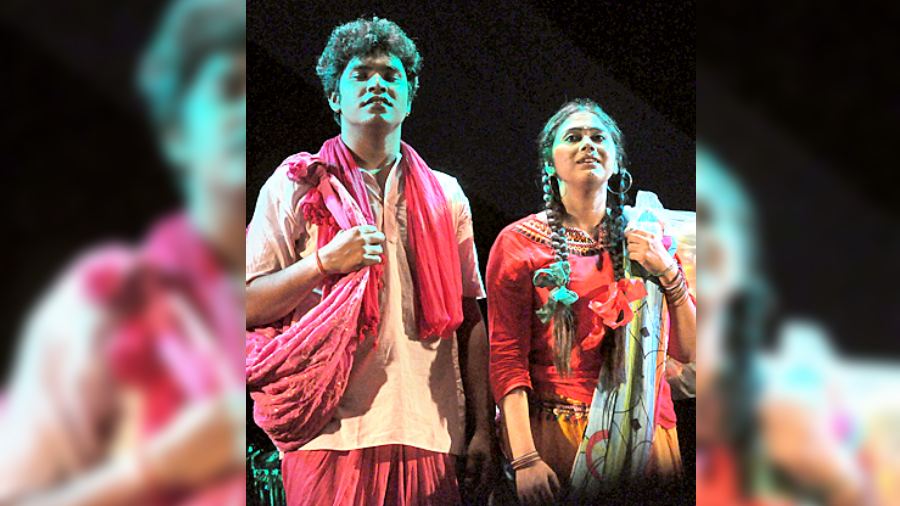Barring a few, theatre groups in Calcutta have never been consistent in exploring the vast resources that are offered by folklore and indigenous performing arts. The overpowering influence of the colonial aesthetic may have receded over the decades, but connecting to the roots has always been a problem. Not for Nabamayukh Nattya Sangstha. Ever since it stormed the city’s theatre scene with Bhadreshwarir Galpa two decades back, the group, initially nurtured by Khaled Chowdhury and spearheaded by Rishi Mukherjee, has presented a series of dramas inspired by indigenous forms and the tales embedded in these traditions. Thag Thagi is the latest to join the fray. The play premiered at the Academy of Fine Arts on March 30 and was staged for the second time at Tapan Theatre on April 10.
The narrative is deceptively simple. Set in an undefined time, Thag Thagi traces the journey of two rural misfits — Goth (Arijit Roy Chowdhury) and Gothi (Sukanya Banerjee) — who form a team to dupe others and make a living out of fraud. Sounds familiar? It is no wonder that Thag Thagi takes a serpentine route as it chronicles all the adventures and misadventures of the characters. There are recurring encounters with a rich man (Aniruddha Mukherjee) and the main narrator (Swagata Mukherjee) chips in at regular intervals to keep the strike rotating. The innocence-to-experience tale ends on a happy note, much like every folktale does. Bibek (Rishi Mukherjee) holds the moral structure aloft.
Nabamayukh’s hold over live music was on display, much to the delight of the audience. Swagata Mukherjee carries the show. Her innate ability to interact with the audience and superior singing skills came in handy. A few comic interludes, in the line of alienation effect, added to the entertainment quotient.
Although the form is rooted in the artistic traditions of the south-west districts of Bengal — it played a significant role during the Swadeshi movement when revolutionaries passed messages in codified forms — Swagata Mukherjee’s costume design crafted a pan-Indian look. Rishi Mukherjee’s vast experience in making a drama out of folklore and giving it a musical touch indicate that the director is poised to reach greater heights.










